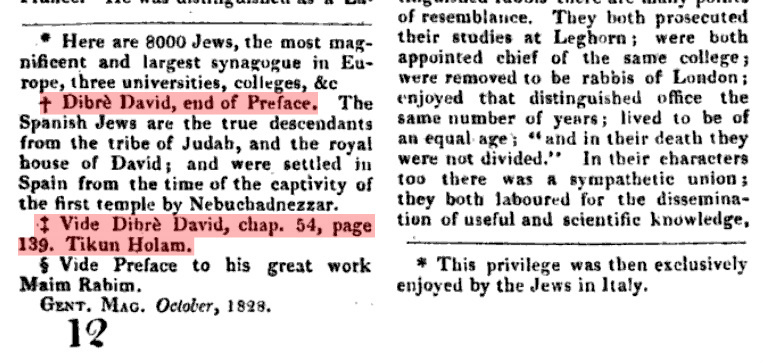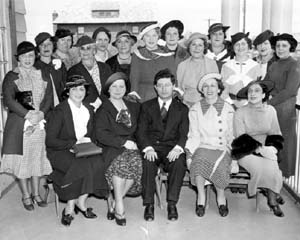A quote you often see floating around the net, and variations of I've found in publications as early as 1895, is:
To communicate anything to a Goy about our religious relations would be equal to the killing of all Jews, for if the Goyim knew what we teach about them they would kill us openly. ... If a Jew be called upon to explain any part of the rabbinic books, he ought to give only a false explantion. Whoever will violate this order shall be put to death.— Libbre David 37.
.
-
Rabbi David Ben Aryeh Loen of Lida, Lithuanian (died
c.1698), wrote a book called Dibre Dawid published
in Poland in 1723 or 1724, according to The Jewish
Encyclopedia (1903.
Vol.4. p.461). His wikipedia entry,
which in turn cites the Encyclopedia Judaica (which
I personally can't check) states this rabbi's name
was David ben Aryeh Leib (1650 - 1696), and that he
wrote a book called "Divrei David, 1671". He was
the chief Ashkenazi rabbi in Amsterdam for a period,
where he published several books. This book indicates
that he may of been the son of the rabbi I've listed
immediately below, the TaZ, who is also credited by The
Jewish Encyclopedia as writing a book entitled Dibre
Dawid.
-
Rabbi David Ben Samuel HaLevi known as the TaZ (1586 -
1667) of Poland, wrote a book called Dibre Dawid or Dibre
David, which was a "supercommentary on Rashi's
Exegesis to the Pentateuch," and was was posthumously
published in 1689, according to The Jewish
Encyclopedia (1903.
Vol.4. p.469), and the Menorah
Institue for Research and Publishing of Manuscripts
and Rare Books Inc. (New York).
-
Rabbi Aaron Ben Jacob HaLevi Horowitz of Russia (lived
during the 2nd half of the 17th century), he
revised Rabbi David Ben Samuel HaLevi's Dibre Dawid (immediately
above), adding his own commentary regarding all of the Book
of Genesis, and a letter justifying his work.
According to the The Jewish Encyclopedia (1904.
Vol.6. p.465)
-
David Meldola (1714 - c.1818) wrote a book called Dibre
Dawid, published in Amsterdam in 1752 or
1753, according to The Jewish Encyclopedia (1904.
Vol.8. p.453). The book is also mentioned by the Union
of American Hebrew Congregations, 19th Annual Report.
1892. p.2986,
and by Professor Herman Strack (see below).
-
Isaac Cohen Belinfante (died 1781) of Amsterdam, wrote a
book called Dibre David, according to The
Jewish Encyclopedia (1902,
Vol.2, p.660).
-
Rabbi David ben Solomon ibn Abi Zimra or Zamiro, known
as the Radbaz (c.1479 - 1573), wrote a book called Dibre
David, eventually published in Livorno, Italy in
1828, according to The Jewish
Encyclopedia (1903.
Vol.4. p.469). The "Radbaz" was a child expellee
from Spain, he became Chief Rabbi of Egypt, and was the
teacher of Isaac Luria, who would later develop the
horrendously racist form of Jewish mysticism known as
Lurianic Kabbalah, which teaches Jews how to become "master
of the terrestrial world." This book can be downloaded
for free here (in
Hebrew), here is
page 37 from the second part of the book (there is no
page 37 to the first part [see JE link for contents of
the book], according to an Orthodox Jew and aspiring
rabbi who frequents Yahoo Answers).
-
David Ginsburg (who might have been baptised-Jew
Christian David Ginsburg 1831 - 1914, see his article in The
Jewish Encyclopedia 1905.
Vol.5. p.669) wrote a book called Dibre David,
according to Hermann Strack (Jüdische
Geheimgesetze?. p.6)
-
Rabbi David (Tebele) Ephrati (1850 - 1884) of Frankfurt,
wrote a book called Dibre Dawid, published in
1875, according to The Jewish Encyclopedia (1903.
Vol.5. p.193)
- Rabbi David Cohen (1902) of Djerba (a Tunisian island), wrote a book called Dibre David (Words of David), according to The Jewish Encyclopedia (1903, Vol.4, p.146). I believe Rabbi Cohen was still alive when this volume of the JE was published, they don't make it very clear (unless I've missed the key to deciphering their listings).
Following are the earliest variations of the Dibre David quote I've found in non-Jewish sources:
In an article entitled Juifs et Chrétiens á Vienne (Jews and Christians in Vienne) by M. A. Kannengieser, which appeared in the French monthly magazine Le Correspondant in December 1895, it states:Communiquer à un non-Juif, est-il écrit dans le Dibre David, quelques-uns de nos livres de religion, c'est en quelque sorte tuer tous les Juifs, car si les non-Juifs savaient ce que nous enseignons contre eux, ils nous assommeraient tous.Translation (improvements welcomed):
Communicating to a non-Jew, it is written in the Dibre David, some of our books of religion, is tantamount to killing all Jews. For if the Gentiles knew what we teach against them, they would slaughter all of us.
In the August 1912 edition of the German arts magazine Der Kunstwart, in an article entitled Aussprache Mit Juden (Discussion with the Jews), it states:Talmud, Dibre David § 37: Einem Nichtjuden etwas aus unsern Religionslehren mitteilen, ist soviel als alle Juden töten; tut man das Erstere, so muß notwendig das Letztere darauf folgen. Denn wüßten die Nichtjuden, was wir gegen sie lehren, würden sie uns dann nicht alle totschlagen?Translation (improvements welcomed):
Talmud, Dibre David Section 37: Passing on anything of our religious doctrines to a non-Jew is tantamount to killing all Jews; if the former is done, the latter must be the necessary consequence. For if the non-Jews knew our doctrines against them, would they not then slaughter us all?
In the July 1, 1924 (Vol. I. No. 12. p.7) edition of the New York Protestant magazine The American Standard, it states:
To communicate anything to a Gentile about our religious relations would be equal to the killing of all the Jews; for if the Gentiles knew what we teach about them, they would kill us openly. If a Jew will be called to explain any part of the rabbinic books, he only ought to give a false explanation, that he might not, by behaving differently, become an accomplice in betraying these informations. Who will violate this order shall be put to death." — Libbre David, 37
THE SUPPOSED DEBUNKINGS
(this I've manually copied this from the Fraktur alphabet it was published in, apologies for any errors, but the original page can be read here)
Das Flugblatt 5 des Ausschusses für Volksaustlärung [!]. Landesstelle Mecklenburg in Rostock, unlängst auch in Berlin verteilt, schreibt: „Geheim sind die Lehren der Juden — Talmud, Schulchan Arukh und die rabbinischen Schriften — bis auf den heutigen Tag. Warum? In Libere [of] Dawid* steht geschrieben: „Ein Jude ist verpflichtet, einem Nichtjuden, wenn er über eine Stelle der rabbinischen Schriften gefragt wird, diese falsch auszulegen : denn wüßten die Nichtjuden, was wir gegen sie lehren, würden sie uns denn nicht alle totschlagen?"
* [Andre antisemitisch „Gelehrte" und Flugblatt haben „Libre David" oder „Dibre David", letzteres auch mit dem Zusatz „§ 37". In dem so betitelten Buch« des David ben Rafhael Meldola, Amsterdam 1753, ist weder der oben angeführte Satz noch etwas Nehnlichet zu finden. Auch zwei andere so benannte Bücher (David ben Salomo abi Vimra, Livorno 1828; David Ginzburg, Frankfurt A.M.) enthalten nichts Hierhergehöriges. — Theod. Fritsch, Beweis-Material. ». Aufl.. S. 204 (8. Aufl.. G, 161 s.) sagt, der angeführte Satz stehe in „einem lemberger hebräischen Journal"! H. Str.]
Translation (improvements welcomed):
A pamphlet (no. 5) published by the Committee on Volksaustlärung (Volk = the people/folk ; Aufklärung = clarification) [!], at their regional office in Rostock, Mecklenburg, was recently distributed in Berlin. It stated: "Secret teachings of the Jews to the present day - Talmud, Shulchan Arukh, and the rabbinic writings. It claims: "It is written in Libre David*, Whenever a Gentile asks a Jew for information about a passage in the rabbinical writings it is the duty of the Jew to expound it falsely; for if the Gentiles knew what we are teaching against them would they not kill us all?" "
* [Other anti-Semitic "scholarly" leaflets cite "David Libre" or "Dibre David", the latter also with the addition of "number 37". In the so-titled book (Dibre David) by David Raphael ben Meldola, Amsterdam, 1753, neither of the claimed sentences, nor anything like them, are found. Two other books entitled Dibre David (by David ben Solomon Abi Vimra, Livorno 1828, and David Ginzburg, Frankfurt AM) contain nothing asserted here. Theodor Fritsch, The Evidence Against Yahew (3rd edition. p.204, 8th edition p.161) says that the quotation appeared "in a Lemberger Hebrew Journal"! H. Strack]
Rabbi Bloch had the following to say on the Dibre David quote:
A pamphlet (number 5) originating in Mecklenburg states: "It is written in Libre David, Whenever a Gentile asks a Jew for information about a passage in the rabbinical writings it is the duty of the Jew to expound it falsely; for if the Gentiles knew what we are teaching against them would they not kill us all?"
Libre David, of course, makes no sense; such a Hebrew word does not exist. Evidently is meant Dibre David. There are, it is true, three Hebrew books of this title; one of them printed in the 18th century in Amsterdam, the other two (of the 19th century) published in Leghorn and in Frankfurt respectively. Strack obtained all the three books and decalres briefly and to the point: there is nothing of the kind to be found in any of them.— Bloch. Joseph S. Translated by: Kellner, Leon. Revised by: Schneiderman, Harry. Israel and the Nations. Berlin: Benjamin Harz Verlag. 1927. p.4
As you can read from what Bloch wrote about the Dibre David quote, the "Hercules" of Jewish apologia, relied absolutely on a goy (Hermann Strack), albeit a righteous goy, whose short, sweet and thoroughly unthorough explanation of the falseness of the Dibre David quote had been published two years prior. Along with not even pretending to add any of his own personal knowledge on books called Dibre David, Bloch also fails to mention that Strack excluded Dibre David by the great TaZ (no. 2 in my list of Dibre David books), and insists there were only three books of this name, when in fact there were far more than three.
Repeatedly, for example, Libbre David 37 is cited as the source for the statement: "If a Jew be called upon to explain any part of the Rabbinic books, he ought to give only a false explanation. Whoever will violate this order shall be put to death." There is no such Hebrew word as Libbre. What is obviously meant is Dibre David. It is interesting that the corruption Libbre David follows the misprint of the German original (a pamphlet quoted by Bloch, Israel and the Nations, page 4). Several books by the name of Dibre David were published, the earliest in 1671 and some as late as the nineteenth century. Strack (Geheimgesetze, page 6) took the trouble to search all books by that name and pronounced the text a complete and unadulterated forgery. No such passage or any passage expressing such sentiments is to be found in any of these books.— Talmudic Forgeries by Ben Zion Bosker. Contemporary Jewish Record. July-August 1939, Volume II, No.4 p.15.
As you can tell, Bosker relied on both Strack and Bloch's books, but Bosker evidently noted the large mistake made by Strack and perpetuated by Bloch i.e. that there were only "three Hebrew books of this title, so Bosker simply increased it to "several." He correctly asserted, "the earliest in 1671 and some as late as the nineteenth century" were published, but he then lied by claiming "Strack ... took the trouble to search all books by that name", which anyone who checks his cited sources would, as I did, immediately discover is a blatant lie. Bosker also incorrectly claims that Strack wrote that the Mecklenburg pamphlet No. 5, stated the book was entitled Libbre David, when he clearly did not, Strack claimed that it read "Libere [of] David", and others antisemitic pamphlets cited "David Libre" or "Dibre David".
The 1941 Universal Jewish Encyclopedia, also relying totally on Hermann Strack and Rabbi Bloch, states of the Libbre David 37 quote:
CANARD
To communicate anything to a Goy about our religious relations would be equal to the killing of all Jews, for if the Goyim knew what we teach about them they would kill us openly. ... If a Jew be called upon to explain any part of the rabbinic books, he ought to give only a false explantion. Whoever will violate this order shall be put to death.Reference, Libbre David 37.
FACT
The whole passage is a brazen forgery. There is no such work as Libbre David. The closest possible Hebrew title to this alleged work is Dibre David, which is cited in some anti-Semitic literature as the reference. There are three Hebrew books that bear this title: the Christian scholar Hermann Strack searched all three and found not the slightest trace of such statements.—The Universal Jewish Encyclopedia, Volume III. New York: The Universal Jewish Encyclopedia Press. 1941. pp.4-5.
The Universal Jewish Encyclopedia simply repeats what Strack implied, and Bloch brazenly asserted as fact: "There are three Hebrew books that bear this title". As already proven—and what the liar Rabbi Bosker knew full well—there are far more than 3, there are at least 7, possibly 9 or more "books that bear this title". Unlike The Jewish Encyclopedia, which can be searched for free online, the Universal Jewish Encyclopedia is still in copyright, and a digital edition costs (U.S.) $89.00. It would be interesting to see if they too list more than 3 books entitled Dibre David, but I'm not prepared to pay that much to find out. I have already proven conclusively that they were completely wrong in their assertion that "There are three Hebrew books that bear this title".
VAN HYNING LEAFLET
"To communicate anything to a goy about our religious relations would be equal to the killing of all Jews, for if the goyim knew what we teach about them they would kill us openly. (Libbre David 37)."RESEARCH FINDINGS
Libbre David 37. This is a complete fabrication. No such book exists in the Talmud or in the entire Jewish literature. Here again there is some internal evidence of the work of the fabricator. Libbre is probably a corruption of Liber, which is part of "Liber David", the Latin for Book of David (the psalms of the Bible). [pages 171 - 172]
VAN HYNING LEAFLET
"If a Jew be called upon to explain any part of the rabbinic books, he ought to give only a false explanation. Who ever will violate this order shall be put to death. (Libbre David 37)."RESEARCH FINDINGS
Libbre David 37. There is no such book, as previously noted. [page 175]Kominsky, Morris. The Hoaxers: Plain Liars, Fancy Liars and Damned Liars. Massachusetts: Branden Press, Inc. 1970.
To give "comrade Morris Kominsky" his due, he didn't rely on Strack's 1920 effort—probably because he'd never heard of it—nor does display ignorance in a field in which he claims expertise, à la Rabbi Bloch, and nor did he knowingly write falsehoods in the manner Rabbi Bosker. Kominsky was correct, there is no book called Libbre David, but his theory about the Book of Psalms is too daft to comment further on.
"Many agreed with Rabbi David ben Shemu’el ha-Levi (Taz) that Poland was a place where “most of the time the gentiles do no harm; on the contrary they do right by Israel” (Divre David; 1689)."



























.jpg)

.jpg)

.jpg)
.jpg)










First class research, Black Rabbit, a job well done!
ReplyThanks a lot.
More on N°. 3: here.
ReplyAlso, N°. 6: here.
N°. 10? David Tewel Katzenellenbogen: here.
Thanks for the reminder, I need to update it with a cut off date. I also found several others published after 1920, e.g.
http://www.ebay.com/itm/ws/eBayISAPI.dll?ViewItem&item=370627720945
But they're just not relevant to this. Nor are massive biographies on all of the authors, not when I link to the JE for them.
What a clown. You wasted all that time and energy for what? You haven't proven the quote exists and in fact you admit that. At most you have proven that A) all debunkers are correct, there is no "Libbre David" B) there ARE 5 books that have a similar title C) 3 of those books do NOT have the quotation. In other words, you haven't done anything. Your comment about a copy of a book surely having been "santized" belies an inherent bias. Instead of taking pot shots at people who were ALL correct and then patting yourself on the back as if you have uncovered some sort of intellectual conspiracy, you ought to actually read the book you INFER actually contains the quotation.
ReplyOh it's you wolfie.
A. The earlist "antisemitic" sources I found which cite it, call it "Dibre David". "Libbre David" is clearly a spelling mistake.
B. There at least 8 books published prior to 1895 which are called Dibre David (spelling varies) this title, more have been published since.
C. More than 3 of these books do not have the quotation
"Instead of taking pot shots at people who were ALL correct ..." But they weren't, were they.
Excellent work, as always. Here is a tiny correction regarding the Gothic text ; the first line should read :
ReplyDas Flugblatt 5 des Ausschusses für Volksaufklärung
'Volksaufklaerung' : Volk - the people ('folk'), Aufklaerung - clarification.
Thanks.
LUTHER PENDRAGON
Thanks ever so much for pointing out the error. I've amended it now.
Cheers.